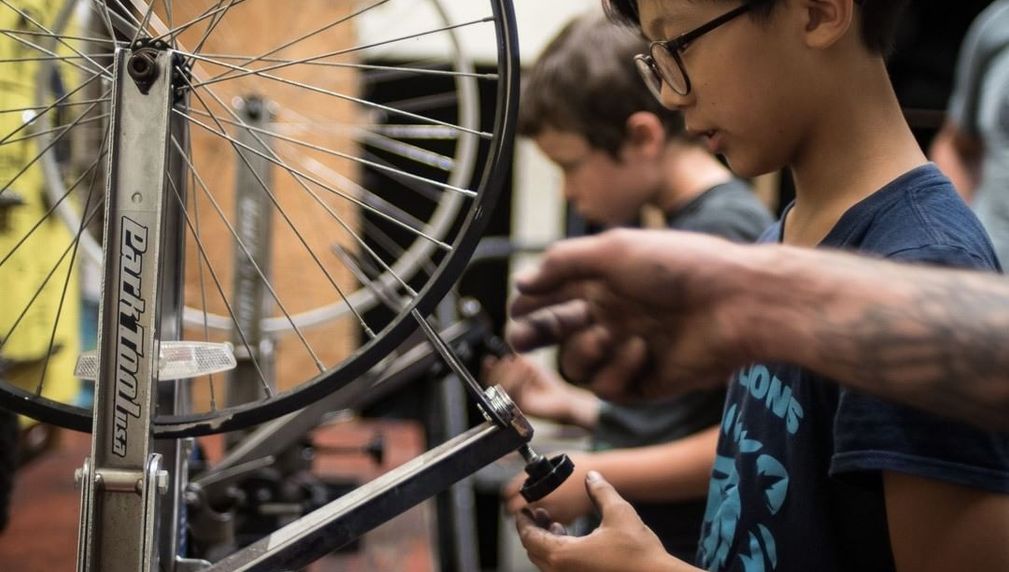Bikes for the People
What has two wheels and can simultaneously address social, environmental, and economic injustice issues? By providing free bikes, accessories, and bike maintenance and safety courses to underserved individuals lacking access to transportation, the Bicycle Kitchen can increase their mobility and access to fundamental resources. This also provides them with the empowerment, enjoyment, and health benefits of owning and riding a bike that they know how to repair themselves if needed.

In which areas of Los Angeles will you be directly working?
Central LA
What is the problem that you are seeking to address?
While Los Angeles is widely considered a “city built around cars”, there are many underprivileged groups that have limited access to vehicles or other modes of transportation. For these groups, the bicycle may be their only feasible means of accessing essential resources, including employment, education, health care, and social services. While the bicycle can be a fun, safe, healthy, and accessible form of transportation, many individuals who could benefit from owning a bike cannot afford to buy one and do not know how to maintain or ride one safely on the streets of Los Angeles. If these individuals could have access to bikes and develop maintenance and safe riding skills, it would not only increase their mobility and access to fundamental resources, but also provide them with the empowerment, enjoyment, and health benefits of owning and riding a bike that they know how to repair themselves if needed.
Describe the project, program, or initiative that this grant will support to address the problem identified.
With this grant, we would like to partner with Cahuenga Branch Library, Los Angeles LGBT Center, and other organizations providing services to underserved individuals, to identify those who lack access to transportation. We will partner with Bikerowave to provide participants with bicycles and accessories, and we will teach them how to properly maintain their bikes. We will then provide maintenance and safe-riding classes using Bicycle Kitchen staff, volunteers, and licensed instructors to help participants gain confidence and knowledge while successfully riding on the streets of Los Angeles. Each month of the program, we will serve three separate cohorts of 5 participants each. Each cohort will attend three bicycle maintenance classes held on-site at our shop. Staff from the Bicycle Kitchen will teach participants how to build their bike and perform crucial maintenance tasks, including changing wheels, replacing tubes, and installing handlebars and a drivetrain. Each cohort will then attend two bike safety classes led by licensed instructors at the Bicycle Kitchen and on nearby streets. The Bicycle Kitchen will organize optional group rides through surrounding neighborhoods and parks, including many experienced riders and a support vehicle. The group rides will serve as an opportunity for participants to solidify their riding skills while integrating into the Los Angeles cycling community. All classes and group rides will be socially-distanced following CDC guidelines.
In what stage of innovation is this project, program, or initiative?
Pilot or new project, program, or initiative
Approximately how many people will be impacted by this project, program, or initiative?
Direct Impact: 165
Indirect Impact: 1,650
Describe how Los Angeles County will be different if your work is successful.
Cycling may lead to better, healthier lives and help participants engage more actively with their community. Access to a working bicycle will help expand participants’ mobility and create economic and other opportunities. Bicycling also has a number of health benefits. For instance, cycling commuters have lower rates of cancer and heart disease compared to other types of commuters. Furthermore, cycling has a lower environmental impact than driving, and more cyclists on the road will help mitigate the growing problems related to motorized vehicle traffic throughout Los Angeles. These benefits would have substantial social, economic, and environmental impacts, and pave the way towards a better version of the county we all love and call home.
What evidence do you have that this project, program, or initiative is or will be successful, and how will you define and measure success?
Each participant that completes this program will have gained access to reliable transportation that can be used year-round with minimal expense. We would like to gauge their perceptions before and after the program through surveys and testimonials. A partial sample of our survey is shown here: 1. Do you feel that you have reliable access to transportation? 2. Do you feel that you have adequate access to essential resources, including employment, education, health care, and social services? 3. How confident are you on a bike? 4. Do you know how to do basic repairs on a bike (fix a flat, adjust your brakes, etc.)? 5. How often do you use a bicycle to... (go to school/work, exercise, etc.) 6. How likely are you to attend bicycle-related events throughout Los Angeles? We hope to see improvements across all of these metrics, showcasing the ability of this program to create impacts in terms of economic opportunity, physical health, and community building.
Describe the role of collaborating organizations on this project.
Cahuenga Branch Library (Los Angeles Public Library) - This library branch will help us find program participants and advertise the program. Los Angeles LGBT Center (Children, Youth & Family Services) - This center will help us find program participants and advertise the program. Bikerowave - We will source additional necessary bicycle hardware from this fellow L.A. bicycle cooperative.
Which of the PLAY metrics will you impact?
Walking and biking
Obesity
Access to open space and park facilities
Indicate any additional LA2050 goals your project will impact.
LA is the healthiest place to LIVE